Sen. Angus King joins in celebrating Rockport’s broadband debut
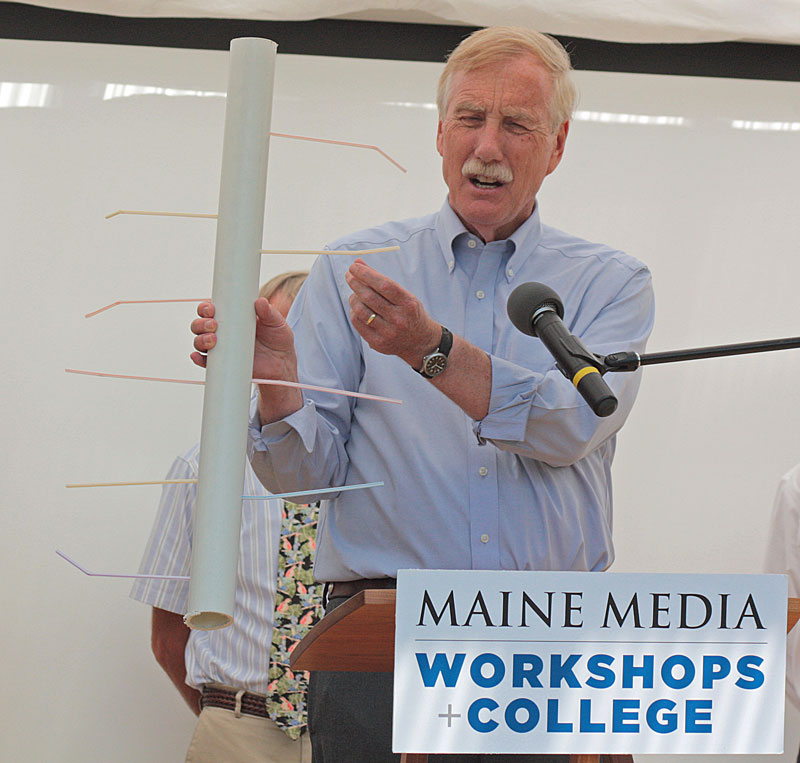 Using the analogy of a poorly designed water system, U.S. Sen. Angus King holds up an example of what Maine’s Internet connectivity looks like today, with one big pipe bringing in water to many tiny pipes that can’t move it quickly into homes and businesses. King was in Rockport Monday afternoon to celebrate the launch of the town’s new broadband Internet connectivity in a limited portion of the village business district. (Photo by Holly S. Edwards)
Using the analogy of a poorly designed water system, U.S. Sen. Angus King holds up an example of what Maine’s Internet connectivity looks like today, with one big pipe bringing in water to many tiny pipes that can’t move it quickly into homes and businesses. King was in Rockport Monday afternoon to celebrate the launch of the town’s new broadband Internet connectivity in a limited portion of the village business district. (Photo by Holly S. Edwards)
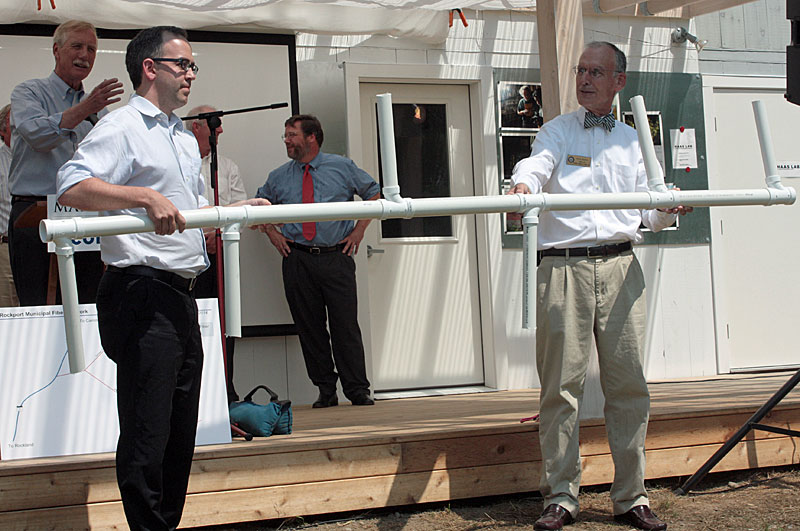 This is what Maine's first municipally-owned, ultra-fast fiber Internet network looks like, if it looked like a water delivery system. (Photo by Holly S. Edwards)
This is what Maine's first municipally-owned, ultra-fast fiber Internet network looks like, if it looked like a water delivery system. (Photo by Holly S. Edwards)
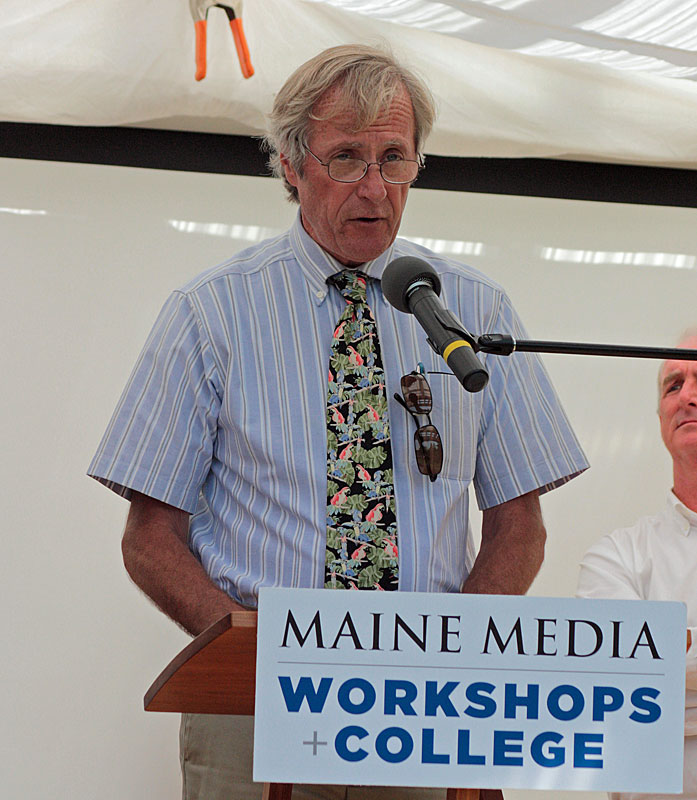 Rockport Town Manager Rick Bates. (Photo by Holly S. Edwards)
Rockport Town Manager Rick Bates. (Photo by Holly S. Edwards)
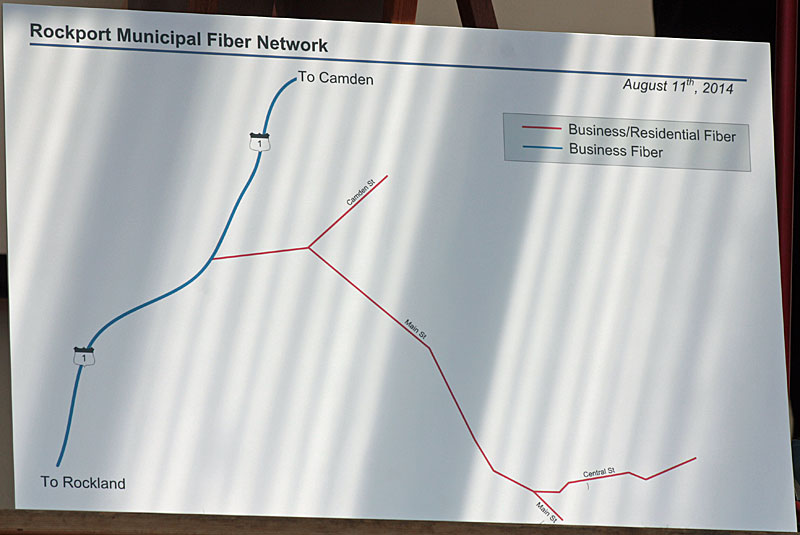 (Photo by Holly S. Edwards)
(Photo by Holly S. Edwards)
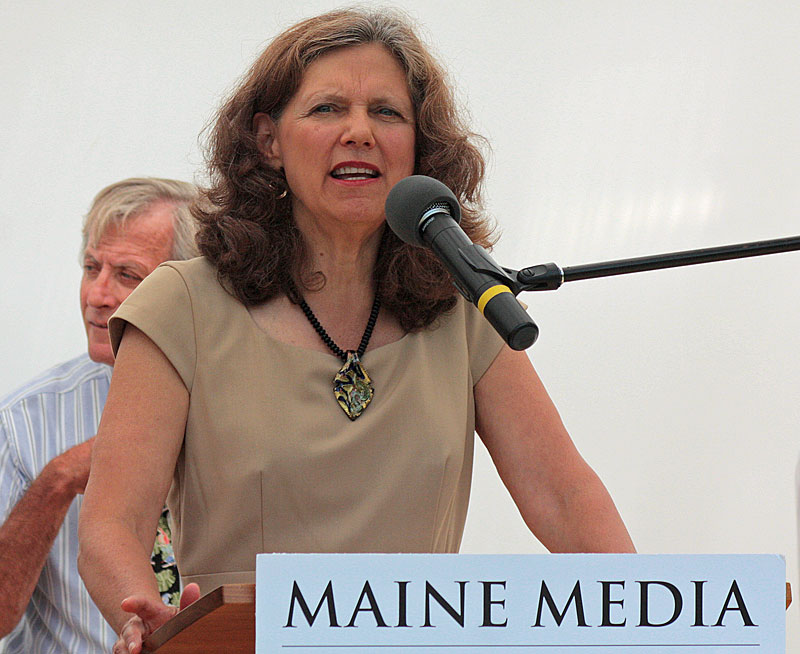 Maine Media Workships + College President Meg Weston. (Photo by Holly S. Edwards)
Maine Media Workships + College President Meg Weston. (Photo by Holly S. Edwards)
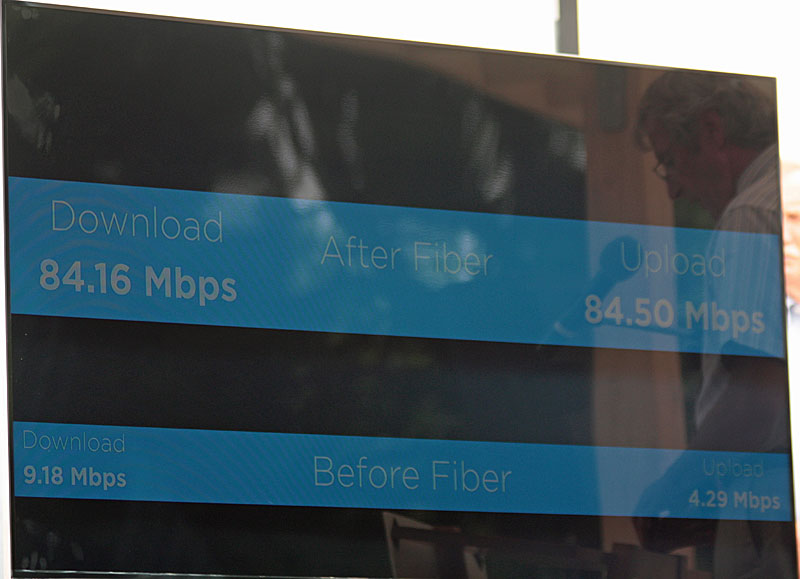 (Photo by Holly S. Edwards)
(Photo by Holly S. Edwards)
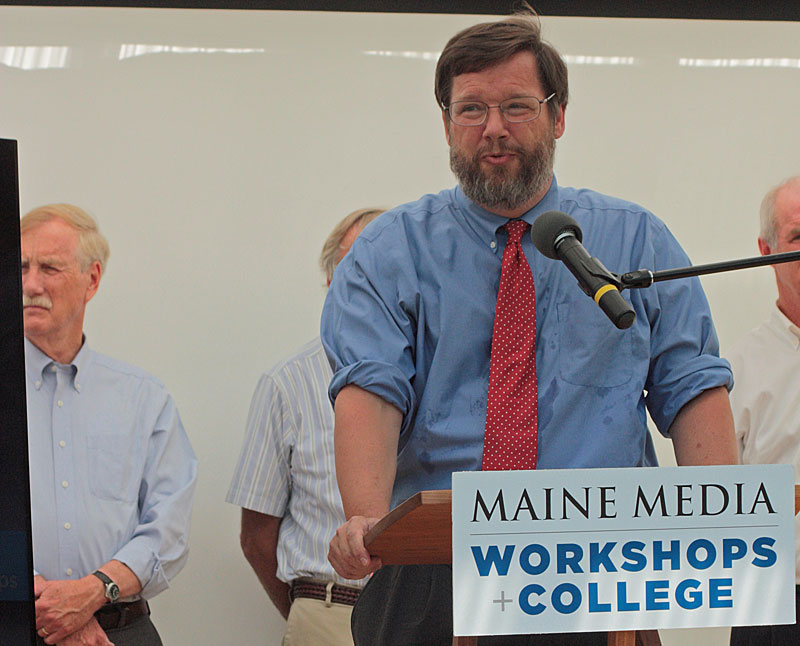 GWI Founder and CEO Fletcher Kittredge. (Photo by Holly S. Edwards)
GWI Founder and CEO Fletcher Kittredge. (Photo by Holly S. Edwards)
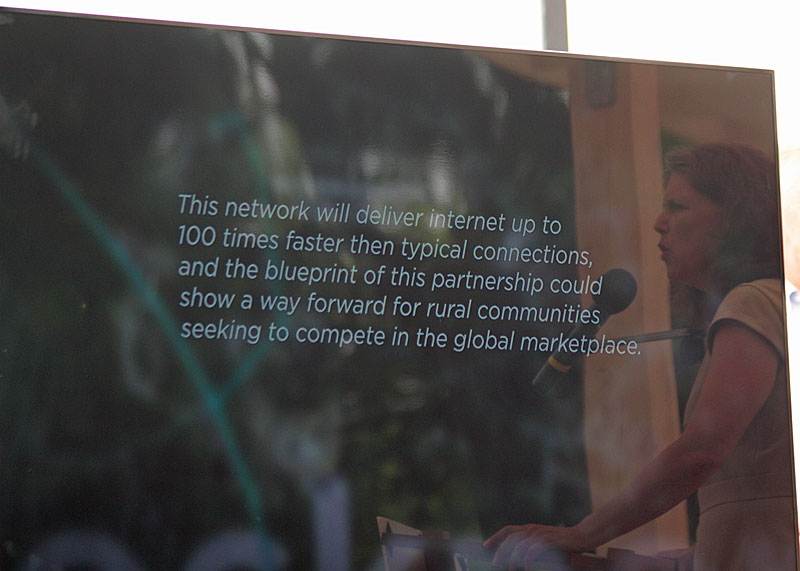 (Photo by Holly S. Edwards)
(Photo by Holly S. Edwards)
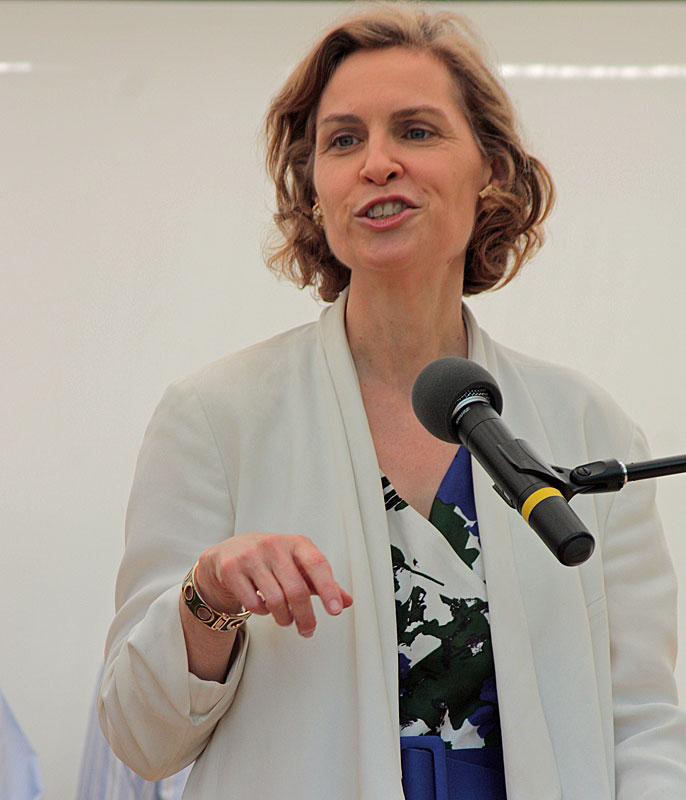 At Sen. Angus King’s invitation, Susan P. Crawford, who served as President Barack Obama’s special assistant for science, technology and innovation policy in 2009 and is a leading advocate for high-speed internet access in the U.S., also attended and spoke at Monday’s event in Rockport. (Photo by Holly S. Edwards)
At Sen. Angus King’s invitation, Susan P. Crawford, who served as President Barack Obama’s special assistant for science, technology and innovation policy in 2009 and is a leading advocate for high-speed internet access in the U.S., also attended and spoke at Monday’s event in Rockport. (Photo by Holly S. Edwards)
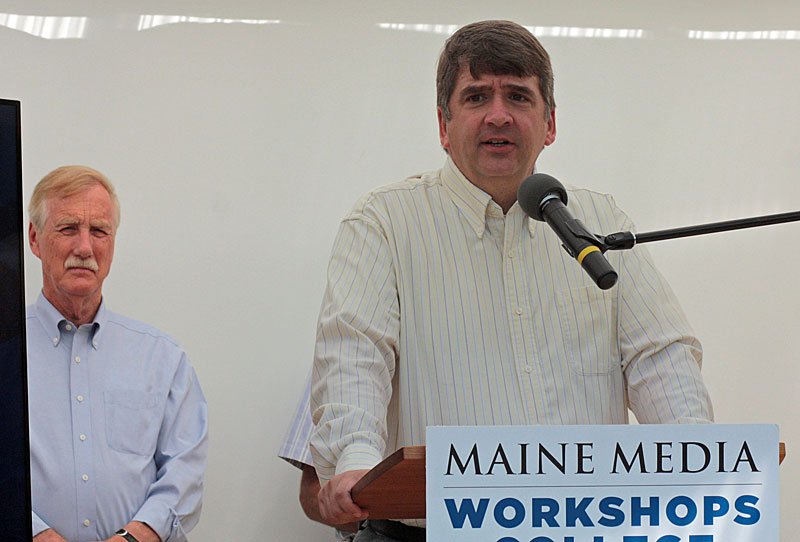 Network Maine Executive Director Jeff Letourneau. (Photo by Holly S. Edwards)
Network Maine Executive Director Jeff Letourneau. (Photo by Holly S. Edwards)
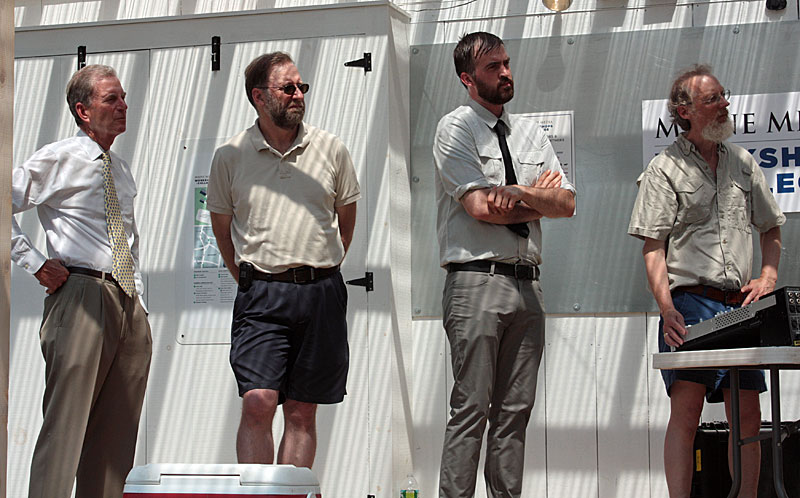 Three of Rockport’s Select Board members attend the press conference Monday at Maine Media Workshops + College. (Photo by Holly S. Edwards)
Three of Rockport’s Select Board members attend the press conference Monday at Maine Media Workshops + College. (Photo by Holly S. Edwards)
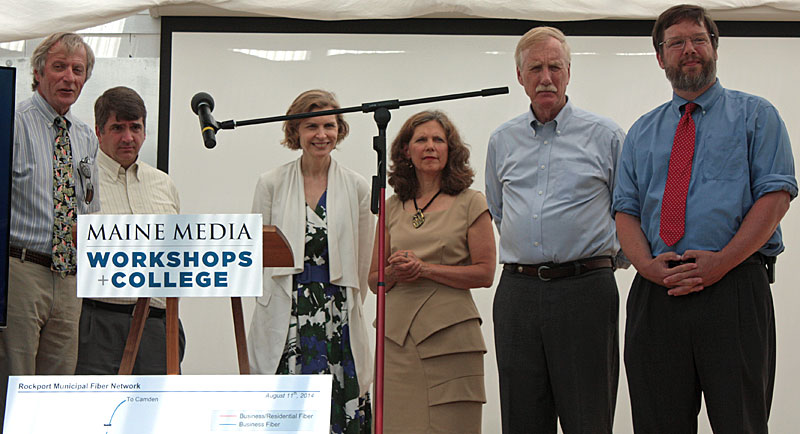 The group waits for questions from those attending Monday’s press conference. (Photo by Holly S. Edwards)
The group waits for questions from those attending Monday’s press conference. (Photo by Holly S. Edwards)
 Using the analogy of a poorly designed water system, U.S. Sen. Angus King holds up an example of what Maine’s Internet connectivity looks like today, with one big pipe bringing in water to many tiny pipes that can’t move it quickly into homes and businesses. King was in Rockport Monday afternoon to celebrate the launch of the town’s new broadband Internet connectivity in a limited portion of the village business district. (Photo by Holly S. Edwards)
Using the analogy of a poorly designed water system, U.S. Sen. Angus King holds up an example of what Maine’s Internet connectivity looks like today, with one big pipe bringing in water to many tiny pipes that can’t move it quickly into homes and businesses. King was in Rockport Monday afternoon to celebrate the launch of the town’s new broadband Internet connectivity in a limited portion of the village business district. (Photo by Holly S. Edwards)
 This is what Maine's first municipally-owned, ultra-fast fiber Internet network looks like, if it looked like a water delivery system. (Photo by Holly S. Edwards)
This is what Maine's first municipally-owned, ultra-fast fiber Internet network looks like, if it looked like a water delivery system. (Photo by Holly S. Edwards)
 Rockport Town Manager Rick Bates. (Photo by Holly S. Edwards)
Rockport Town Manager Rick Bates. (Photo by Holly S. Edwards)
 (Photo by Holly S. Edwards)
(Photo by Holly S. Edwards)
 Maine Media Workships + College President Meg Weston. (Photo by Holly S. Edwards)
Maine Media Workships + College President Meg Weston. (Photo by Holly S. Edwards)
 (Photo by Holly S. Edwards)
(Photo by Holly S. Edwards)
 GWI Founder and CEO Fletcher Kittredge. (Photo by Holly S. Edwards)
GWI Founder and CEO Fletcher Kittredge. (Photo by Holly S. Edwards)
 (Photo by Holly S. Edwards)
(Photo by Holly S. Edwards)
 At Sen. Angus King’s invitation, Susan P. Crawford, who served as President Barack Obama’s special assistant for science, technology and innovation policy in 2009 and is a leading advocate for high-speed internet access in the U.S., also attended and spoke at Monday’s event in Rockport. (Photo by Holly S. Edwards)
At Sen. Angus King’s invitation, Susan P. Crawford, who served as President Barack Obama’s special assistant for science, technology and innovation policy in 2009 and is a leading advocate for high-speed internet access in the U.S., also attended and spoke at Monday’s event in Rockport. (Photo by Holly S. Edwards)
 Network Maine Executive Director Jeff Letourneau. (Photo by Holly S. Edwards)
Network Maine Executive Director Jeff Letourneau. (Photo by Holly S. Edwards)
 Three of Rockport’s Select Board members attend the press conference Monday at Maine Media Workshops + College. (Photo by Holly S. Edwards)
Three of Rockport’s Select Board members attend the press conference Monday at Maine Media Workshops + College. (Photo by Holly S. Edwards)
 The group waits for questions from those attending Monday’s press conference. (Photo by Holly S. Edwards)
The group waits for questions from those attending Monday’s press conference. (Photo by Holly S. Edwards)
ROCKPORT — Likening Internet connectivity to public utilities, which U.S. Sen. Angus King (I-Maine) Monday afternoon called "necessary components for economies and countries to flourish," he joined Rockport Town Manager Rick Bates and others on the campus of Maine Media Workshops + College to announce the official launch of Maine's first municipally-owned, ultra-fast fiber Internet network.
"The reason this is so important is that for the first time in human history people can work where they live instead of having to live where they work," said King. "People have been freed of geography and it gives them an opportunity to choose where they're going to do their work and where they're going to work from."
King said the key is having the connections, so that places, whether its Maine, Bangladesh, India or Mexico, can join the world community.
"It's a question of connections, and that's really what we are talking about and celebrating today," said King.
Joining King for the announcement Aug. 11 were Maine Media College President Meg Weston, Rockport Town Manager Rick Bates, Network Maine Executive Director Jeff Letourneau, GWI CEO and founder Fletcher Kittredge and Harvard Law School Professor Susan Crawford, who also served as President Barack Obama's special assistant for science, technology and innovation policy.
Weston said that now being able to provide ultra-fast gigabit connectivity makes it possible for Maine Media College students to better utilize the newest photography and cinematography technology and distribute and share their work online. It also will provide opportunities for streaming classes and workshops online, for students who can't attend the college in person, and for all students to eventually have the opportunity to "be on set" with filmmaker instructors via the Internet.
"At one time a student would come here and they would connect to the Internet on the computer work station that we gave them," said Weston. "Now they come with three or four different mobile devices and every single one of them is uploading and downloading videos, they're putting huge files of their images onto DropBox or some other vehicle on the Internet to share and we needed more capacity, more bandwidth to handle those demands that are here today."
The fiber optic connectivity changes the playing field for everyone at the college, and allows it to continue to be "leaders of media arts education in this beautiful village," but Weston added that it was a project that could not have been undertaken by them alone.
"It took partnership," Weston said. "It took the generosity of a donor who serves on our board; the experience, knowledge and participation of Network Maine; the capability of GWI to build the network; and most of all the vision of the town of Rockport itself, to become the first municipally owned fiber optic network in the state of Maine."
Letourneau praised the "visionary leaders" who had a goal and set out upon themselves to make it happen.
"I was first brought into this project a year or so ago, and I could see immediately we had all the right people in play," said Letourneau. "We had an anchor institution like Maine Media , we had a town manager who really wanted to see something happen and we had an Internet service provider willing to think a little bit outside the box and try something different."
Letourneau said his role was as "translator" between the partners, all with different levels of technical knowledge and experience. He said he got to be a part of helping the groups better understand the drivers between the public sector and commercial sector of Internet connectivity, and how they could bring their strengths together and overcome their various weaknesses, eventually coming together to create something better together than had they tried to di it on their own.
"This model is fairly unique in the fact that the town itself has created a fiber optic infrastructure that is really a new marketplace for the town of Rockport," said Letourneau. "There is no single service provider that is was built for, it's open to anybody to be able to make use of and the fact that Maine Media College is connected to the state's research and education network, MaineREN [Maine's Research & Education Network], while the community itself and the residents and businesses will be connected via various retail service providers is a great example of that."
For Kittredge, whose company worked to build and string the fiber optic network, he was gratified to partner with the group to help realize their vision, but more importantly, to be a part of setting the framework for future advances locally, in Maine and, hopefully, around the country.
As CEO of GWI for 20 years, he said he's learned that Maine's people, and business and elected leaders, are nimble, collaborative and entrepreneurial.
"We have a culture of self-reliance and Yankee ingenuity," said Kittredge. "We are used to taking hard problems and coming up with clever solutions for them. And that's important because we have a big challenge in front of us."
Kittredge said that Internet infrastructure is a "key part of economic development," a statement made by others that followed him and spoke Monday.
"The state is going to commit economic suicide unless it really pays attention to this issue," said Kittredge. "It's a problem we need to fix. There is no business anymore that is not touched by the Internet. And every individual needs it. Fortunately, the tools that I mentioned are enough to get the job done. I believe that if we start seeding the state with projects such as this, it will become self-evident to all business leaders, local, state, and federal officials what needs to be done and that we have a history of working together collaboratively and rapidly coming up with solutions."
He said that ultimately, he believes that Maine will end up with a "really superior Internet," and that it will make a huge difference statewide.
Bates said that it's become "common" for Mainers to see Internet download speeds of 15 megabits per second or less, and upload speed of 1 megabit per second, or less.
"This does not allow us to be competitive in today's market. And with every year that goes by, we fall further behind in the global marketplace," said Bates.
Rockport's new network is a gigabit per second network, meaning that it's theoretically capable of transmitting 1,000 megabits of data per second.
A graphic loop on a big screen on stage showed that prior to the installation of the fiber network, a typical user's download bandwidth was 9.18 Mbps with an upload bandwidth of 4.29 Mbps. Post-fiber network installation in Rockport Village, the fiber optic Internet connection is 100 times faster than typical connections. The new fiber optic bandwidth now provides a download speed of 84.16 Mbps and an upload speed of 84.50 Mbps.
Bates said that the new "symmetrical" downloading and uploading bandwidth speeds is critical in a creative economy.
While Rockport is often described as having one of the prettiest harbors, village and rural countryside on the Maine coast, Bates said that inferior broadband has precluded innovative and creative entrepreneurs from around the world to live there because they could not start a business there.
"The sharpest and most innovative entrepreneurs, who will certainly vacation in Rockport, are all about connectivity AND place. Now, with ultra-fast Internet access, they can have both," said Bates.
The service -- which cost about $75,000 to install, $30,000 of which was paid by the town -- is currently only available along a short stretch of Rockport Village, between Maine Media Workshops + College, the Rockport Town Office and the Rockport Public Library, but if and when public demand calls for it, work on spreading the service outward will begin.
King, like Kittredge and the others, said he thinks Maine has an "incredible future." It's a beautiful place to live, and raise a family, and there is no reason to live anywhere else if you can do that, and work from here too.
But the problem, he said, is that Maine's Internet connectivity was created like a poorly designed water delivery system. In the fictional town King called "Andreville," he said there is one large pipe to bring the water in, and many "little, tiny pipes" bringing the water to the consumers. You can't take a shower, it takes too long to fill the bathtub and you can have a drink every now and then, but you don't want to draw too much of it at any time.
"This is the network in much of Maine, this is the water system. The big pipe bringing the water in with the little tiny pipes bringing the water to the people makes the people of Andreville grumpy, unhappy, irritable and somewhat smelly.
Rockport's (Andrevlle's) new fiber network is made up of big pipes bringing "water" in and big pipes bringing "water" to the customers.
"We have the same big pipe going in, but big pipes going to the house," said King. "Information, just like the water, now people can take showers, they can draw a bath in five minutes instead of half an hour, they can have something to drink exactly when they want it. This is exactly what's going on here today. This is how we're going to connect Maine."
He said that towns that don't offer broadband won't be able to attract business, and thus won't be able to attract people to live there. Those towns, he said, are doomed.
He said four things are needed to accomplish expanding Rockport's broadband model across the state: a plan, partnerships, perseverance and passion.
"Rick Bates had a vision for this community; you have a plan. There were all kinds of partnerships involved in this. Anything of this consequence requires people who are willing to not take no for an answer, to push through obstacles and make it happen. And you've got to have people who believe, who are passionate and are going to see that it happens, who believe in the future and have an optimistic view of the future and opportunities for their fellow citizens."
When Crawford took her place at the podium, she made it clear that she believed King was the person to bring Rockport's collaborative achievement to a wider audience.
She said Monday's event was linked to the completion of the last link in the Transcontinental Railroad 145 years ago this summer, in that it was the closing of an "enormous infrastructure moment, much like this moment today in Rockport."
She said it was President Abraham Lincoln's vision for the First Transcontinental Railroad, and the vision was then carried forward with public-private partnerships across many links until its final moment at Promontory Summit in Utah.
She said the President Franklin D. Roosevelt led the push to having electricity reaching everybody in the United States, and that we would not have the federal highway system without President Dwight Eisenhower.
"Without local leadership, we're not going to see fiber around the country," said Crawford. "Sen. Angus King should be a national voice, taking up the mantle of leadership to show what's possible when a town collaborates and makes sure that its citizens can not only download the water and take a shower, but as the students at this college know, you've got to be able to upload. Only fiber makes that possible."
She said the time has come to present new ways of making and building a business, and new ways of making a living. And that means changing the world by using this broadband connectivity.
"Sen. King can lead this across the country, because mayors are sick of settling for second-class, hugely expensive service," said Crawford. "Without everybody on this platform working together, it wouldn't have happened. Without leadership, our imaginations won't be fired up the same way that closing of the golden spike in Utah 145 years ago this summer, fired the imagination.
"I am looking forward to Sen. King leading the country in explaining why this makes a difference, and the steps we have to go through to ensure that every American has world class, inexpensive, frictionless connectivity for the future of the country."
Related link:
Event Date
Address
70 Camden Street
Rockport, ME 04856
United States













































